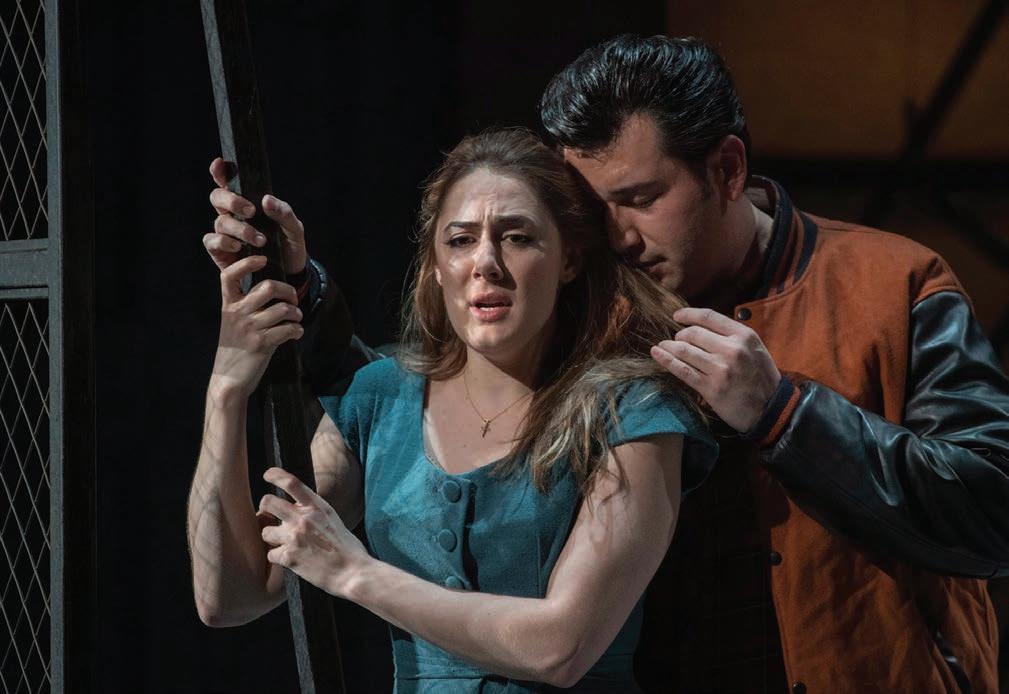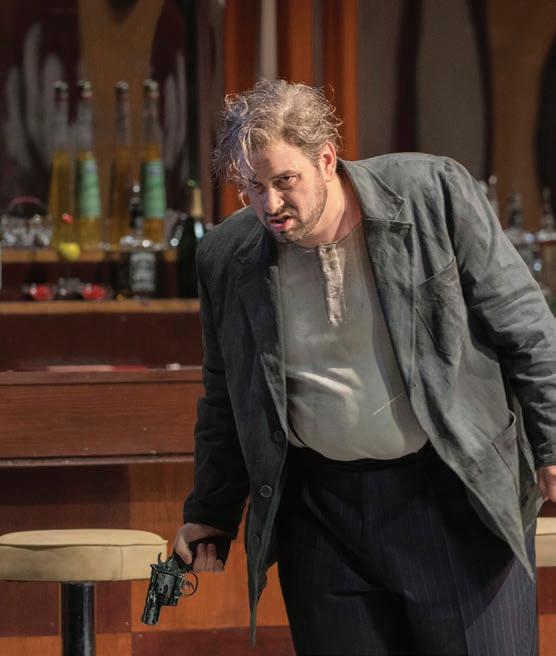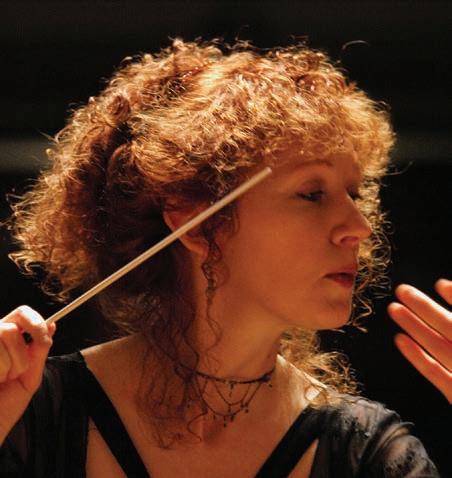Rigoletto

October 14-22, 2017
MUSIC
Giuseppe Verdi
LIBRETTO
Francesco Maria Piave after Victor Hugo’s Le roi s’amuse
WORLD PREMIERE
Teatro la Fenice - Venice, Italy
March 11, 1851
CONDUCTOR
Stephen Lord
ORIGINAL STAGE DIRECTOR
Jonathan Miller
REVIVAL STAGE DIRECTOR
Elaine Tyler-Hall
CHORUS MASTER
Suzanne Mallare Acton
SET/COSTUME DESIGN
Patrick Robertson
LIGHTING DESIGN
Kevin Sleep
REVIVAL LIGHTING DESIGNER
Martin Doone
WIG & MAKEUP DESIGN
Joanne Middleton Weaver
ASSISTANT DIRECTOR
Rebecca Herman
ASSISTANT CONDUCTOR
Daniel Black
SUPERTITLES
Dee Dorsey
STAGE MANAGER
Ken Saltzman
*Scenery and costumes were created for English National Opera and are owned by English National Opera.
CAST
(In order of vocal appearance)
The Duke of Mantua: Joshua Guerrero (Oct. 14, 18, 21) John Bellemer (Oct. 22)
Borsa: Matthew DiBattista
The Countess Ceprano: ..................................................................... Kara Mulder
Rigoletto: Roland Wood (Oct. 14, 18, 21) Nicholas Pallesen (Oct. 22)
Count Ceprano: Erik Van Heyningen+
Cavaliere Marullo: ...................................................................... Harry Greenleaf+
Count Monterone: Kenneth Kellogg
Sparafucile: Christian Zaremba
Gilda: So Young Park (Oct. 14, 18, 21) Hae Ji Chang (Oct. 22)
Giovanna: Briana Elyse Hunter+
Maddalena: Nicole Piccolomini
Usher: Matthew Konopacki
Page: Schyler Sheltrown
SYNOPSIS Act 1
Scene 1
The Duke of Mantua is in his club, boasting to one of his followers about his success with women. He proceeds to flirt with the Countess Ceprano, while Rigoletto cruelly mocks her husband. Meanwhile, another acquaintance, Marullo, tells his friends of a surprising discovery: he has heard that Rigoletto has a mistress hidden away at home.
Rigoletto continues to taunt the Count who retaliates by arranging a midnight meeting with some of the other members present where he will extract his revenge.
An elderly nobleman, Count Monterone, enters and denounces the Duke for seducing his daughter. He curses the Duke and when mocked by Rigoletto, Monterone turns on him and curses him as well. The curse strikes terror in Rigoletto, for the woman he lives with is not his mistress, but his daughter.
Scene 2
Brooding over Monterone’s curse, Rigoletto returns to the home he shares with his daughter, Gilda, hiding her away from the licentiousness that takes place at the Duke’s club.
On his way home, he is confronted by Sparafucile, a professional assassin, who offers him his services. Rigoletto sends him away, but then muses on the parallels between their professions.
Gilda greets her father, and begins to ask him questions about their family and background, which he refuses to answer. Determined to protect Gilda he forbids her to leave their home, except to attend church. He also warns Gilda’s companion, Giovanna, not to allow anyone to enter the house while he is out. However, the Duke steals in and hides. While in hiding, he is astonished to hear Rigoletto call Gilda his daughter as he bids her farewell.
Gilda confesses to Giovanna that she is in love with a young man who has been following her home every day after church. On hearing this, the Duke appears and declares his love for Gilda, identifying himself as Gualtier Maldè, a penniless student. Hearing footsteps, he rushes off, leaving Gilda thinking lovingly of his name.
The club members appear, masked and ready to abduct Rigoletto’s supposed mistress. He surprises them by returning, but Marullo convinces him that they are planning to abduct the wife of Count Ceprano who lives nearby. Rigoletto falls into their trap,
permitting himself to be blindfolded and masked. Unknowingly, he assists the conspirators in their abduction of his daughter. Gilda cries out to her father as she is carried off. Becoming suspicious, Rigoletto tears off the blindfold, realises Gilda is gone and cries, ‘Ah, the curse!’
Act 2
The Duke laments the loss of Gilda but when he is told of the abduction, he rejoices that she is now at his club.
When Rigoletto appears, he feigns nonchalance. Once it becomes clear to him that Gilda must be with the Duke, he tries to reach her, but the club members hold him back. His denunciation of their treachery dissolves into a bereft father’s pleading.
Left alone with Rigoletto, Gilda confesses that she is in love with the Duke and begs her father to forgive him. As Monterone is led to his execution, Rigoletto swears that they both will be avenged.
Act 3
Rigoletto has brought Gilda to Sparafucile to prove her lover’s faithlessness. As they lurk in the darkness, the Duke enters. After proclaiming the fickleness of women, he showers attentions on Maddalena, the assassin’s sister, as Rigoletto tries to comfort his despairing daughter. He orders her to disguise herself as a boy and leave town. After striking a bargain with Sparafucile for the Duke’s murder, Rigoletto departs.
Gilda returns in her disguise in time to overhear Maddalena begging her brother to spare the handsome stranger’s life. Sparafucile agrees to deceive Rigoletto by substituting the corpse of the next person who appears. Having returned determined to sacrifice herself so the Duke may live, Gilda becomes Sparafucile’s next victim.
At the stroke of midnight, Rigoletto pays the assassin and reserves for himself the satisfaction of throwing the sack containing his enemy’s corpse into the river. When he hears the Duke’s voice in the distance, he opens the sack and finds his daughter instead of the Duke. Begging her father’s forgiveness, she dies. The despairing Rigoletto cries out once more, ‘Ah, the curse!’
Courtesy of English National Opera
Suzanne Mallare Acton
Chorus Master
Suzanne Mallare
Acton has received wide acclaim for her choral direction involving more than 125 productions in seven languages. Conducting credits include West Side Story, The Music Man, Pirates of Penzance, The Mikado, Daughter of the Regiment, Carmen, La Traviata and Carmina Burana with The Medium for MOT; My Fair Lady and La Traviata for Dayton Opera; Merry Widow and Madame Butterfly for Artpark; and Tosca for Augusta Opera. As founding Director of the MOT Children’s Chorus, Ms. Acton was instrumental in developing the inaugural season. She is also the Artistic and Music Director of metro Detroit’s Rackham Choir.
John Bellemer
Possessed of a voice the New York Times described as “clarion-toned”, John Bellemer continues to appear in leading roles at opera houses across North America and Europe. He has previously sung with Michigan Opera Theatre as Don José in Carmen in 2009. Throughout his extensive career, Mr. Bellemer has performed as Faust (Austin Lyric Opera, Hawaii Opera Theatre), Don Ottavio in Don Giovanni (Boston Lyric Opera), Der Steuermann in Der fliegende Holländer (Austin Lyric Opera), Rodolfo in La bohème (Arizona Opera), Nadir in Les pêcheurs de perles (North Carolina Opera), Lysander in A Midsummer Night’s Dream (Hawaii Opera Theatre), Alfredo in La traviata (Opera Theatre of Saint Louis), and Male Chorus in The Rape of Lucretia (Maggio Musicale, Florence). Mr. Bellemer holds a bachelor’s degree from James Madison University and a master’s degree from the University of Illinois. He lives in New York with his wife, Sarah Blaze, and their Parson Russell Terrier, Scout.
Hae Ji Chang
Soprano Hae Ji Chang makes her Michigan Opera Theatre debut as Gilda in Rigoletto. She has been described as “an exciting young artist on the rise” (Opera Boston) with a voice “full of silvery color and nuance” (Boston Globe). Recent performances include Mimi in La Bohème with Opera Theatre of Saint Louis and Pamina in The Magic Flute in Korea. Previous work also includes originating the role of Setsuko in Jack Perla’s An American Dream with Seattle Opera, Gilda with PORTopera, Pamina with Opera San Jose and Susanna in The Marriage of Figaro with Aspen Opera Theater. Ms. Chang has also performed with the Baltimore Symphony Orchestra, the Colorado Music Festival Chamber Orchestra and the West Los Angeles Symphony. She trained as a Domingo-ColburnStein Young Artist with LA Opera, performing under Plácido Domingo, and was a Gerdine Young Artist with Opera Theatre of Saint Louis.


Matthew DiBattista
Recently described as “brilliant” and “mega-talented” by Opera News, tenor Matthew DiBattista makes his debut with Michigan Opera Theatre as Matteo Borsa in Rigoletto. He has performed with the Metropolitan Opera, Lyric Opera of Chicago, Florida Grand Opera, Opera Theatre of Saint Louis, Boston Symphony Orchestra, as well as other major orchestras, festivals, and conductors across the U.S. and abroad. An alumnus of University of Cincinnati Conservatory of Music, Mr. DiBattista has recently performed Normano in Lucia di Lammermoor with Lyric Opera of Chicago, Don Basilio in Le Nozze di Figaro with Boston Lyric Opera, the First Jew in Salome with Minnesota Orchestra, and he can be heard in recording as the title role in Kamran Ince’s Judgment of Midas with Albany Records. In the 2017-18 season, Mr. DiBattista debuts with the Santa Fe Opera as Goro in Madama Butterfly and as Scaramuccio in Ariadne auf Naxos in the summer of 2018.
Harry Greenleaf
Wixom, Michigan native Harry Greenleaf is Michigan Opera Theatre Studio’s resident baritone. He made his debut with Michigan Opera Theatre in 2016 in the role of Top in The Tender Land His credits with MOT also include Le Bret in Cyrano, Jake Wallace in The Girl of the Golden West and Morales in Carmen. He has been a Studio Artist with the Wolf Trap Opera Company, an Apprentice Artist with Des Moines Metro Opera and a Young Artist with the Glimmerglass Festival. He holds a Master of Music degree from the University of Cincinnati College-Conservatory of Music and is an alumnus of the Michigan State University College of Music. Future performances include working as a Young Artist at the Glimmerglass Festival this summer. This season, Harry will perform with MOT as Marullo in Rigoletto, Sciarrone in Tosca and the roles of Leo Stein and Man Ray in Ricky Ian Gordon’s 27


Joshua Guerrero
Tenor Joshua Guerrero makes his Michigan Opera Theatre debut as the Duke in Rigoletto Recently Mr. Guerrero was seen at Los Angeles Opera and Zurich Opera in Macbeth


He also made his London debut at the English National Opera in Rigoletto In concert, he toured Europe with Gustavo Dudamel and the Simón Bolivar Orchestra singing
Beethoven’s Symphony No.
9 and was a featured soloist at the Richard Tucker Music Foundation Gala at Carnegie Hall. Future engagements include debuts with Glyndebourne Festival in Madama Butterfly, Florida Grand Opera in Lucia di Lammermoor, Canadian Opera Company in Rigoletto and a return to Santa Fe Opera for Madama Butterfly. He will also be heard in a concert of opera arias and duets with soprano Joyce El-Khoury and the NDR Radiophilharmonie, which will be broadcast on television throughout Germany.
Briana Elyse Hunter
Joyce Cohn Young Artist
Briana Elyse Hunter returns for her second year as Michigan Opera Theatre Studio’s resident mezzosoprano. Her MOT credits include Wowkle in The Girl of the Golden West, Jo March in Little Women, Madeleine Audebert in Silent Night and Mercedes in Carmen. She has been on the rosters of Santa Fe Opera, Knoxville Opera, American Opera Projects, Opera in the Heights, the I SING BEIJING festival, Sarasota Opera, El Paso Opera and Music Academy of the West. She most recently performed at The Glimmerglass Festival as Annie in Porgy and Bess and covered Arsamenes in Xerxes. She holds a Master of Music degree from the Manhattan School of Music in vocal performance and a bachelor’s degree in theater from Davidson College. This season, she will perform Giovanna and cover Maddalena in Rigoletto and star as Gertrude Stein in Ricky Ian Gordon’s 27 with MOT.

Kenneth Kellogg
Washington D.C. bass Kenneth Kellogg makes his Michigan Opera Theatre debut as Count Monterone in Rigoletto. He will reprise the role of Sam Bankhead in Daniel Sonenberg’s The Summer King, which he originated with Pittsburgh Opera in 2017. Performance highlights include Zuniga in Carmen and Don Alfonso in Così fan tutte with Washington National Opera; Mefistofeles in Faust and Sarastro in Die Zauberflöte with Opera de Lausanne; Gremin in Eugene Onegin with North Carolina Opera and Young Emile Griffith in Terence Blanchard’s Champion with Opera Parallèle. He holds a Master of Music degree from the University of Michigan and a Bachelor of Music degree from Ohio University. He has also served as a resident artist at the Academy of Vocal Arts in Philadelphia and is an alumnus of Washington National Opera’s Domingo-Cafritz Young Artist Program. Future performances include
Handel’s Messiah with the Fairbanks Symphony Orchestra and Don Alfonso in Così fan tutte with the National Philharmonic at Strathmore.
Matthew Konopacki
Baritone Matthew Konopacki, a native of Livonia Michigan, is an active performer of both classical and contemporary works. Equally comfortable on both the operatic and the concert stage, his repertoire ranges from the cantatas of J.S. Bach to the contemporary operatic music of Kevin Puts. With Michigan Opera Theatre, he has performed the roles of 1st Scottish Soldier in Puts’ Silent Night, Servo in Macbeth, and was a part of the featured ensembles in both David DiChiera’s Cyrano and The Magic Flute. He is also a featured singer on the recent release of DiChiera’s legacy album, Letters & Fantasies Matthew holds a master’s degree in Vocal Performance from the University of Houston and has appeared as a young artist with Pensacola Opera and the Janiec Opera Company. He will sing the usher role in Rigoletto and perform in the ensemble of MOT’s 2017-18 season.
Stephen Lord
Stephen Lord joined Michigan Opera Theatre as Principal Conductor in November 2016, and he will lead the company’s artistic activities through the 2018-19 season.
Opera News named Lord one of the “25 Most Powerful Names in U.S. Opera” (one of four conductors), and he is continually praised for conducting both traditional and contemporary operatic works. For his debut with San Francisco Opera, conducting Rigoletto, one critic observed, “He partnered his singers perfectly and gave everything its proper weight he was master of the score’s details and the orchestra played superbly for him.” He is currently Music Director Emeritus for Opera Theatre of Saint Louis and
was formerly the music director of Boston Lyric Opera.

In addition to this work in Saint Louis and Detroit, he has been a frequent guest conductor at the Canadian Opera Company, Lyric Opera of Chicago, Santa Fe Opera, San Francisco Opera and the English National Opera, returning there for four consecutive seasons.
An outstanding mentor and discoverer of young talent, he has been directly responsible for the initial work of Lawrence Brownlee, Russell Thomas, Morris Robinson, Susan Graham, Christine Goerke, Patricia Racette and literally scores more of today’s best singers.

Kara Mulder
Kara Mulder, a soprano from Philadelphia, is making her debut with Michigan Opera Theatre as Countess Ceprano in Rigoletto. After achieving her Bachelor of Music in Voice Performance from the Eastman School of Music at the University of Rochester, she immediately began her Master of Music in Voice at the University of Michigan. Some of Kara’s past roles include Concepción in L’heure Espagnole, Fiordiligi in Così fan tutte, and Juliette in Romeo et Juliette

Nicholas Pallesen
Baritone Nicholas Pallesen returns to the title role in Michigan Opera Theatre’s Rigoletto having sung in this same production at the English National Opera earlier this year. Later this season, he sings both Rigoletto and Germont in La Traviata with Oper Köln and Sharpless in Madama Butterfly at the Santa Fe Opera. Nicholas has performed with the Metropolitan Opera and is a former Met National Council Auditions Finalist, where he was featured in the documentary, The Audition Concurrent to his performing career, Nicholas is also a Board Certified Hypnotist and Transformational Coach who


specializes in assisting artists in career and life. In addition to a full schedule of clients, he speaks regularly on mental wellness at conservatories and young artist programs and is a guest faculty member at Wolf Trap Opera and the New World Symphony. Following this season, Nicholas will retire from performing in order to focus on his private practice.
So Young Park
After performing as the Queen of the Night in Michigan Opera Theatre’s 2016 production of The Magic Flute, soprano So Young Park returns to MOT as Gilda in Rigoletto. A native of Pusan, South Korea, she is a graduate of the Domingo-ColburnStein Young Artist program with the Los Angeles Opera, where she performed the role of Queen of the Night, Gossip in The Ghosts of Versailles and Barbarina in Le Nozze di Figaro, as well as Pat Nixon in the Music Center’s 50th Anniversary Concert. She recently made her Los Angeles Philharmonic debut as a Soprano Soloist in Beethoven’s Choral Fantasy. She has performed the Queen of the Night with Boston Lyric Opera, Houston Grand Opera (Miller Theater), the Glimmerglass Festival, Hawaii Opera Theatre, and Opera Colorado. Most recently, she returned to Los Angeles as Blonde in Die Entführung aus dem Serail, Top Daughter in Akhnaten and Olympia in The Tales of Hoffmann. This season she is a member of the Metropolitan Opera.

Nicole Piccolomini
This season, mezzo-soprano Nicole Piccolomini makes her Michigan Opera Theatre debut as Maddalena in Rigoletto. She is a resident concert artist in Kunnersdorf, Germany and will release her first album in collaboration with pianist Christoph Staude featuring songs of Mahler, Wagner, Berg and Brahms. Last season included performances of Quickly in Falstaff with Shanghai Opera,


the title role in Maria de Buenos Aires at Theater Bonn, the Page in Salome with Deutsche Oper Berlin, and Erda in Siegfried with Oper Leipzig. Other recent performances include: Das Rheingold and Siegfried (Oper Leipzig); Wesendonck Lieder (Venice Chamber Orchestra); Rigoletto (Santa Fe Opera, Lyric Opera of Chicago, and Deutsche Oper Berlin); Cherevichki (Teatro Lirico di Cagliari); Nabucco, Götterdämme rung, Luisa Miller, Das Rheingold, Die Zauberflöte, Elektra, and Die Walküre (Deutsche Oper Berlin); Götterdämmerung and Cavalleria rusticana (Opéra national de Paris). Originally from Long Island, New York, she was a resident artist at the prestigious Academy of Vocal Arts and holds a Bachelor of Music from the Juilliard School.
Schyler Sheltrown
Schyler Sheltrown is a soprano hailing from Mattawan, Michigan, where her love for music and opera blossomed, studying with David Hook at Mattawan High School. She is a graduate of Michigan State University, where she received both her bachelor’s and master’s degrees in vocal performance under the tutelage of Melanie Helton. Since graduation, Ms. Sheltrown has been in hot pursuit of her operatic career, performing across Michigan. In her first year out of school, she received an Encouragement Award in the Michigan District’s Metropolitan Opera National Council Auditions, performed the role of Princess Yolanda in The Free Lance with the Comic Opera Guild in Ann Arbor, Michigan and sang her first Beethoven 9th Symphony as the soprano soloist with the Livingston Orchestra in Howell, Michigan. You also may have seen her in the chorus of Carmen last fall. She is thrilled to be back with Michigan Opera Theatre for the full season, especially as the Page in Rigoletto
Elaine Tyler-Hall

Director, choreographer and former dancer Elaine Tyler-Hall has worked with opera companies worldwide. As a staff director for English National Opera, she has revived ENO productions including Orpheus and Eurydice, Orfeo, Duke Bluebeard’s Castle, The Turn of the Screw and Semele She has also worked as assistant and staff director for opera companies including the Royal Opera House, Scottish Opera, Glyndebourne Festival Opera, Bayerisches Staatsoper in Munich, Opernhaus Zurich, and the Kammeroper in Vienna and has directed works for the Psappha ensemble, Riverside Opera and Blackheath Halls. Her choreography in opera includes La fedelta premiata (Garsington Opera), The Jacobin (Scottish Opera), The Greek Passion (Royal Opera House), Benvenuto Cellini (Zurich Opernhaus) and Pelleas et Melisande (Mariinsky Theatre). She has also worked on TV productions and films, including Shakespeare in Love Revivals of David Pountney’s very popular The Cunning Little Vixen have taken her to London, Venice, Milan, Seville, Tel Aviv, Glasgow, Cardiff and Athens. Earlier this year she revived Peter Sellar’s production of The Gospel According to the Other Mary in Bonn and choreographed and assisted on a new production of Sadko with Daniel Kramer in Antwerp.
Roland Wood
English baritone Roland Wood has performed in prestigious opera houses in the United Kingdom and throughout the world. He was a company principal at the Scottish Opera and has performed with The Royal Opera and the English National Opera. He has also performed at the Glyndebourne Festival, Opera North, the Canadian Opera Company, Santa Fe Opera, the English Touring Opera, Nationale Reisopera, the Opera Theatre of Saint Louis and Grange

Park Opera. He studied at the Royal Northern College of Music then National Opera Studio in England. Future performances include Rigoletto with the Canadian Opera Company, Renato in Un ballo in maschera with Grand Park Opera and Giorgio Germont in La Traviata with Welsh National Opera in autumn of 2018.

Erik Van Heyningen

Bass-baritone Erik Van Heyningen makes his debut at Michigan Opera Theatre as a Studio Artist. He has sung with opera companies across the country, including performing as a Richard Gaddes Festival Artist and a Gerdine Young Artist with the Opera Theatre of Saint Louis. Erik performed as an Apprentice Artist at Santa Fe Opera this summer. An avid recitalist, Erik has appeared in recital in cities such as Toronto, San Diego, Boston, and New York. This season, Erik will perform Count Ceprano in Rigoletto, Figaro in The Marriage of Figaro (cover), Ernest Hemingway in Ricky Ian Gordon’s 27 and Angelotti and the Jailer in Tosca at MOT.
Joanne Middleton Weaver
Born in England, Joanne Weaver came to the United States in the late 1980s. She began apprenticing with what was then Washington Opera, now Washington National Opera. Ms. Weaver has since designed at many opera companies throughout the U.S., including Glimmerglass Opera, Central City Opera, Sarasota Opera, Lyric Opera of Kansas City and Des Moines Metro Opera. Her notable Michigan Opera Theatre credits include The Magic Flute, Macbeth, The Passenger, Frida, The Merry Widow, Faust, Margaret Garner, Cyrano and The Pearl Fishers.
Christian Zaremba
Praised by the New York Times as “a stage animal with a big bass voice,” Christian Zaremba makes his Michigan Opera Theatre debut as Sparafucile in Rigoletto. He has recently performed as Master Fal in the U.S. premiere of Milhaud’s La mère coupable with On Site Opera; Colline in La Bohème with Portland Opera and Opera Omaha; Collatinus in The Rape of Lucretia, Bartolo
in Le Nozze de Figaro, Passagallo in Gassmann’s L’Opera Seria with Wolf Trap Opera; Jake Wallace in La fanciulla del West with Opera Omaha; and Commendatore in Don Giovanni with New York’s Venture Opera. A graduate of New York University, Mr. Zaremba was previously a stagecombat-fighter in multiple productions with the Metropolitan Opera. In the 2017-18 season, Mr. Zaremba will return to the Metropolitan Opera for his stage debut as Angelotti in Tosca and will make his debut with Austin Opera as Zuniga in Carmen.







